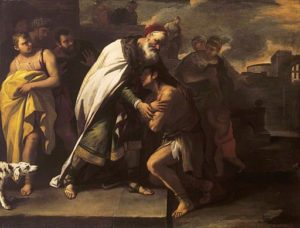Note: On Saturdays, you can find me at Your Daily Tripod, owned by my friend TonyD. A longer version of the post below appears there.
It can be a deep and profound reflection, assuming the role of each person in the parable of the lost son: the profligate young man who made merry by taking his inheritance early, then saw no choice but to return home; the loving father, who ran out to meet him and ordered the feast; the judgmental, jealous older brother who refused to come to the feast and who the father begged to unharden his heart.

Likely, at one time or another, we’ve been each of them in situations in our own lives.
In addition to the role-playing exercise, I like to contemplate on where they all were a few months or even a year later.
- Were the lost son’s heart and soul changed by this mercy? Was he an exemplary son and brother? How did he treat the hired workers? Did he long for the revelry he had experienced those few days, even knowing what had cost him?
- Did the older brother truly put the past behind him in his relationship with his brother and father? Did he develop love and compassion for his brother? Did he cast aside the anger he had expressed to his father?
- And what about the father, the one we all wish we could be, all the time? Did he as the days went on feel duped or taken advantage of? Did the incident drive a permanent wedge between him and his older son?
- Did each “come to life again” in his own way?
We don’t know, of course; after all, it’s a parable. What we do know is that life’s big, public moments can bring out the best or worst in us. What may matter even more is how we live our faith in God and love of neighbor in the small, ongoing pedestrian moments, the days and weeks and months after the wedding, the funeral, the forgiveness, the big embrace. It’s about consistent love and how it renews us and those around us; it brings us back to life, over and over again. Consistent love isn’t showy; it is warm and glowing and predictable. It seeks to gather up all for delivery to God.